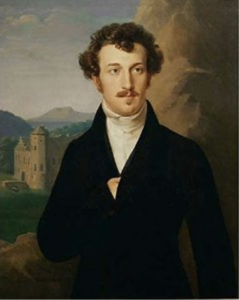Spring song
(Poet's title: Frühlingsgesang)
Set by Schubert:
D 709
for TTBB quartet[probably early 1822]
D 740
for TTBB quartet and piano[probably early 1822]
Schmücket die Locken mit duftigen Kränzen
Und folget der Freude beglückendem Drang,
Begrüßet den Frühling mit heiteren Tänzen,
Den Sieger, der Alles in Liebe bezwang.
Der Winter bedroht ihn mit schauriger Kälte,
Der Sommer verfolgt ihn mit flammendem Speer,
Aber er schwebt unter blauem Gezelte
Sorglos und lächelnd auf Düften daher.
Und die treue Erde
Mit Liebesgebärde
Eilt ihm entgegen,
Es heben und regen
Sich tausend Kräfte in ihrer Brust,
Und künden der Liebe selige Lust.
Es rieseln die Quellen
Und Knospen schwellen,
Blumen erscheinen
Und in den Hainen
Singt Philomele aus tiefer Brust
Und kündet der Liebe selige Lust.
Drum schmücke die Locken mit bräutlichen Kränzen,
Wem schaffende Kraft noch den Busen durchdringt,
Und huldge dem Sieger in heiteren Tänzen,
Der alles mit schaffender Liebe bezwingt.
Adorn your locks with fragrant bouquets
And follow the cheering impulse of joy,
Greet spring with merry dances,
The victor, who conquers everything in love.
Winter threatens it with dreadful cold,
Summer persecutes it with a flaming spear,
But it floats under the blue canopy
Carefree, and goes off smiling on the fragrant breezes.
And the faithful earth
With a loving gesture
Hurries towards it,
Arousing and stirring up
A thousand forces in its breast,
And proclaiming the blessed delight of love.
Springs trickle,
And buds swell,
Flowers appear
And in the groves
Philomel sings from the depths of her breast
And proclaims the blessed delight of love.
So adorn your locks with bridal bouquets,
Anyone whose breast is still permeated by creative force,
And pay homage to the victor with merry dances,
The one who conquers everything with creative love.
All translations into English that appear on this website, unless otherwise stated, are by Malcolm Wren. You are free to use them on condition that you acknowledge Malcolm Wren as the translator and schubertsong.uk as the source. Unless otherwise stated, the comments and essays that appear after the texts and translations are by Malcolm Wren and are © Copyright.
☙
Themes and images in this text:
Blue Buds Chest / breast Cold Competitions and prizes Dancing The earth Fire Flowers Greetings Hair Joy Lances and spears Nightingales, Philomel Smells Spring (season) Springs, sources and fountains Summer Weddings Winter Woods – groves and clumps of trees (Hain) Wreaths and garlands
Much of the imagery of this text depends on the fact that the word ‘spring’ (der Frühling) is a masculine noun in German and ‘the earth’ (die Erde) is feminine. That is why the earth is called faithful: she rushes towards her bridegroom as he returns. We are encouraged to wear ‘bridal bouquets’ in honour of this union.
Spring is also said to be a victor, who has defeated the cold of winter and the flaming heat of summer. ‘He’ is now carefree as he floats across the blue sky on fragrant winds.
☙
Original Spelling and note on the text
Frühlingsgesang
Schmücket die Locken mit duftigen Kränzen
Und folget der Freude beglückendem Drang,
Begrüßet den Frühling mit heiteren Tänzen,
Den Sieger, der Alles in Liebe bezwang.
Der Winter bedroht ihn mit schauriger Kälte,
Der Sommer verfolgt ihn mit flammendem Speer,
Aber er schwebt unter blauem Gezelte
Sorglos und lächelnd auf Düften daher.
Und die treue Erde
Mit Liebes-Geberde
Eilt ihm entgegen,
Es heben und regen
Sich tausend Kräfte in ihrer Brust,
Und künden der Liebe selige Lust.
Es rieseln die Quellen
Und Knospen schwellen,
Blumen erscheinen
Und in den Hainen
Singt Philomele aus tiefer Brust
Und kündet der Liebe selige Lust.
Drum schmücke die Locken mit bräutlichen Kränzen,
Wem schaffende Kraft noch den Busen durchdringt,
Und huld'ge dem Sieger in heiteren1 Tänzen,
Der Alles mit schaffender Liebe bezwingt.
1 Schubert (in both settings) changed Schober´s ´freudigen´(joyful) to ´heiteren´ (merry) (or he may have been working from an earlier draft, and Schober may have made the change before publication).
Confirmed with Gedichte von Franz von Schober. Stuttgart und Tübingen. J. G. Cotta’scher Verlag. 1842, page 10; and with Gedichte von Franz von Schober. Zweite, vermehrte Auflage. Leipzig Verlagsbuchhandlung von J. J. Weber. 1865, pages 8-9.
To see an early edition of the text, go to page 10 [28 von 292] here: http://digital.onb.ac.at/OnbViewer/viewer.faces?doc=ABO_%2BZ20766660X


